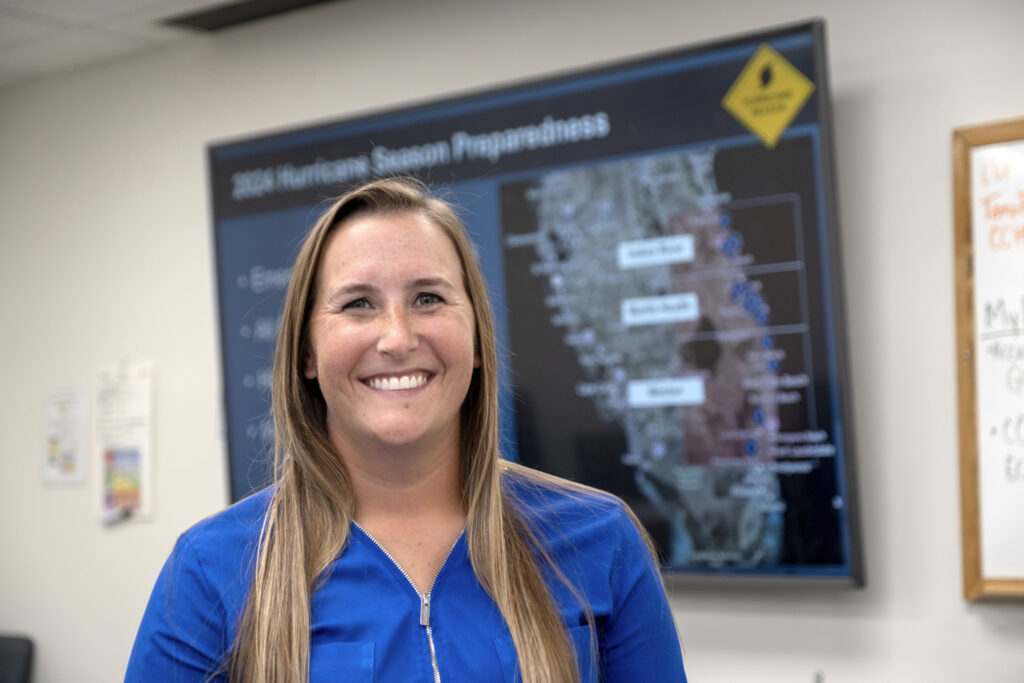Vero Beach has escaped major storm damage in recent years and so far in 2024, but experts keep saying we are in an unusually active hurricane season, and big storms often hit our area in the fall – so there is still time to prepare.
Jennifer Hulse, senior program manager for emergency management at Cleveland Clinic Indian River Hospital, said now is the time to pack emergency medical supplies and prescriptions in the event of an evacuation or the reality of living for days without power.
Evacuating during a storm is always stressful, but for those with special medical needs it’s crucial to have everything you need with you because stores and pharmacies will most likely be closed.
“Preparing a hurricane first aid kit is pretty simple,” she said. “Pack the obvious things like Band-Aids, gauze and ace wraps. But if you are on any type of medication, it’s recommended that you pack a sustainable supply of those medications, just like you were going on vacation.
“For hurricanes, the recommendation is to have at least three days’ worth of your normal medications packaged and ready to go in a Go-Kit that you carry with you if you go to a shelter. You will want to include backup batteries and chargers for your devices like cellphone, CPAP, wheelchair, etc.”
Hulse also suggests having a Stay-at-Home Kit with at least two weeks of food and water and a one-month supply of medication in a childproof container.
“If you are evacuating to a general population shelter, you will keep your meds with you at all times and you are responsible for them for the duration of your stay. If you are checking into a special needs shelter for those with additional needs and higher complexities of illness, there are medical staff onsite who can assist you with the process. When you check into the shelter they will ask if you are bringing in anything dangerous into the facility and either store that medication for you or allow you to keep it in your possession.
“Transport your medication in its original container with your name on it,” she continued.
“If you have a prescription, carry that with you to confirm that you are carrying a legal substance that is prescribed for you.”
In addition, it’s always a good idea to have a printout or written list of the medications you are taking with you at all times.
“Cleveland Clinic patients get a summary after every visit with a printout of their medications,” Hulse said. “Even if you haven’t had a visit for a while, you can always go on MyChart and print out the most up-to-date copy of medications you are taking.”
If you have a medication that needs refrigeration, like insulin, be sure to declare that when you go to a shelter. The staff will help you store it in a secure refrigerator with your name on it. If you are staying home or just evacuating to a friend’s house or nearby hotel, store the medication in a cooler with ice, just as if you were going on a long road trip.
In the event your medication gets lost or damaged during the evacuation, you can try to call your pharmacy to see if they can refill it. Oftentimes, there will be a state of emergency that allows pharmacists to renew or fill needed prescriptions.
“Oxygen-dependent patients would qualify for a special needs shelter,” Hulse said. “You should apply ahead of time, so the shelter team has time to review your medical needs to make sure that they have everything in place before you arrive at the shelter.
“The patient only needs enough oxygen to be transported from their home to the shelter and back. While the county coordinates transport, the vehicle type may or may not have oxygen capability, which is why it’s important to have enough oxygen to get to the shelter. Once they get to the shelter, the shelter provides oxygen and can hook them up in their room.”
For oxygen-dependent patients who choose to stay in their own home, regular mobile oxygen canisters don’t require electricity. If you require humidified oxygen for a CPAP machine or whatever reason, it’s best to check the manufacturers recommendations to make sure you won’t overheat the system by plugging it into a generator.
Patients undergoing chemotherapy will be contacted by their care facility.
“At Cleveland Clinic, the staff will reach out to the patient and coordinate their care to make sure that they are going to be receiving that chemotherapy up until it is no longer safe to do so,” said Hulse. “If your provider is insisting that for the duration of the storm you still need that chemotherapy, we can help you coordinate receiving treatment at another facility outside of the direct impact area.
“The same is true for dialysis patients. Most patients on dialysis can typically make it a few days, as long as we dialyze them correctly. When we time it correctly, we can put them out a little bit longer without there being a medical issue. Of course, all of that is under the guidance of their provider, but we do have a way to coordinate that care and make sure that they’re still able to receive it.”
If there is an evacuation order issued by the state or county for your area, follow it, but only go as far as necessary. The Red Cross advises staying within a 10-mile distance from your home if possible, instead of hundreds of miles away from home, as re-entry into the disaster area may prove difficult.
Most importantly, be prepared and plan before the storm!

